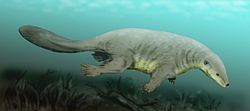| Castorocauda Temporal range: Upper Jurassic
| |
|---|---|

| |
| Scientific classification | |
| Kingdom: | |
| Phylum: | |
| Class: | |
| (unranked): | |
| Order: | |
| Family: | Docodontidae
|
| Genus: | Castorocauda
|
| Species | |
| |
Castorocauda was a genus of small, semi-aquatic proto-mammals which lived in the Jurassic period, about 154 million years ago.
Its fossil was found in lakebed sediments of the Daohugou Beds of Inner Mongolia. Castorocauda was highly specialized, with adaptations like those of modern semi-aquatic mammals such as beavers, otters, and the platypus (convergent evolution). It is the earliest animal found with fur.[1][2]
Castorocauda is one of the near-mammals in a group called the Docodonta.[2]
Although Castorocauda was not a crown group mammal, it is important in the study of how mammals evolved. It was the first find with an almost complete skeleton. Also it is not a "small nocturnal insectivore".[2]
- It was larger than most Mesozoic mammaliaform fossils – about 17 in (43 cm) from its nose to the tip of its 5-inch (130 mm) tail, and may have weighed 500–800 g (18–28 oz).
- It is the earliest absolutely certain evidence of hair and fur. Previously the earliest was Eomaia, a crown group mammal from about 125M years ago.
- It had aquatic adaptations including flattened tail bones and remnants of soft tissue between the toes of the back feet, suggesting that they were webbed. Previously the earliest known semi-aquatic mammaliaforms were from the Eocene, about 110 million years later.
- Castorocauda's powerful forelimbs look adapted for digging. This feature and the spurs on its ankles make it resemble the platypus, which also swims and digs.
- Its teeth look adapted for eating fish: the first two molars had cusps in a straight row, which made them more suitable for gripping and slicing than for grinding. These molars are curved backwards, which helps in grasping slippery prey.
References
[change | change source]- ↑ "Jurassic "beaver" found; rewrites history of mammals".
- ↑ 2.0 2.1 2.2 Ji Q. Luo Z-X, Yuan C-X, and Tabrum A.R. (2006). "A swimming mammaliaform from the Middle Jurassic and ecomorphological diversification of early mammals". Science. 311 (5764): 1123–1127. doi:10.1126/science.1123026. PMID 16497926. S2CID 46067702.
((cite journal)): CS1 maint: multiple names: authors list (link)